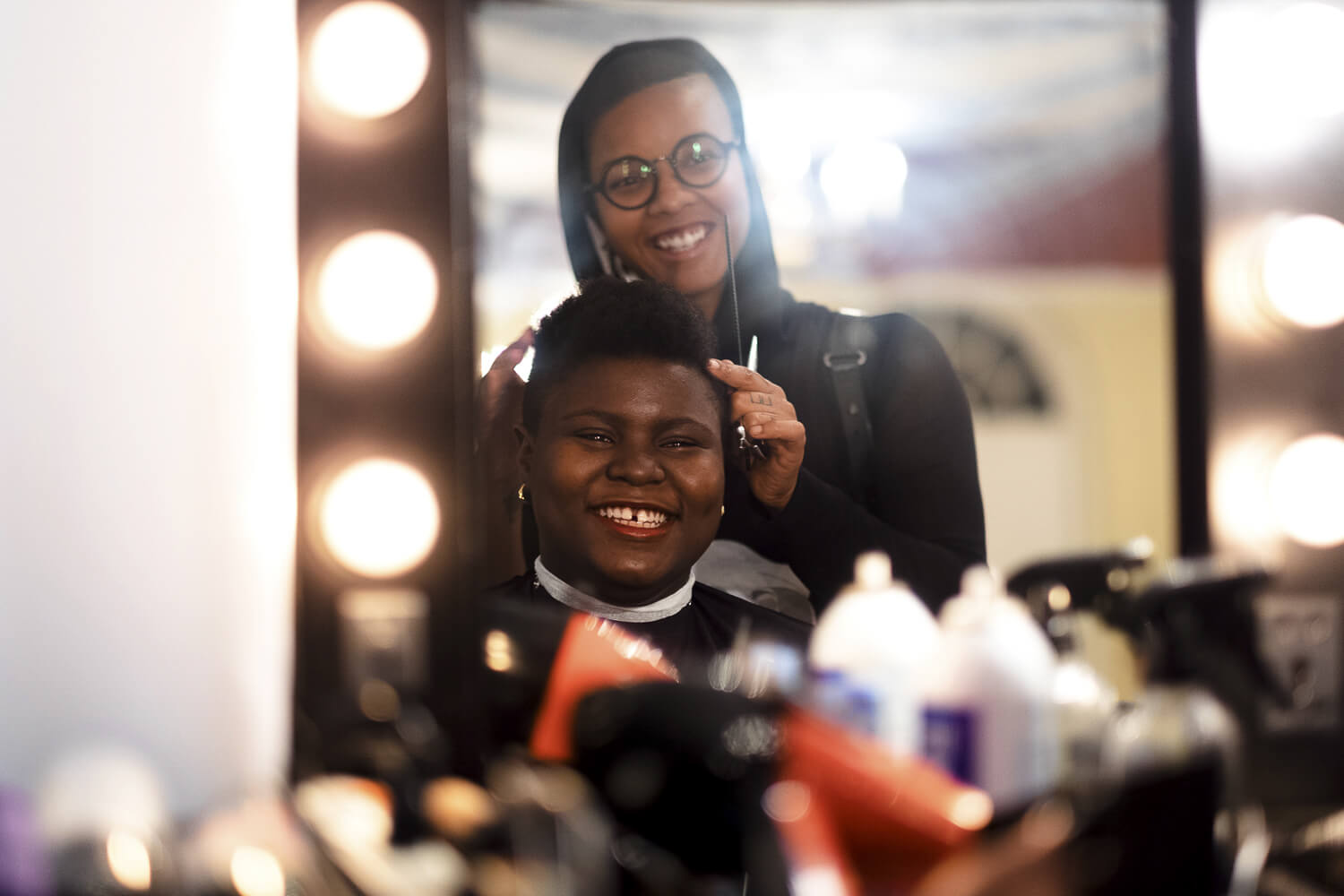Queer youth are one of the most at-risk populations for becoming homeless — at this Spring Street salon they can let their hair down.
The ProjectQ salon lies tucked away on a quiet block on Spring Street in downtown Los Angeles. Etched onto the storefront glass is a barber’s pole. Inside, there is a ficus plant, framed cosmetology licenses and a cross-stitch that reads, “Sugar, Spice, Abolish I.C.E.” Hair is swept up from the floor in quick intervals, clients shoot the breeze with their quick-snipping stylists and a table of young people kick back by a cooler filled with LaCroix. Some of these young people have experienced homelessness. All of them have been around it.
Like any good salon or barbershop, ProjectQ is a space where you can let your hair down. It’s relaxing. Here, queer people and queer people of color, in particular, can receive gender-affirming styles. It is also a community space, a co-op and a refuge where LGBTQ teens experiencing homelessness can drop in for everything from free haircuts to lessons on how to do your taxes.
According to a nation-wide study at the University of Chicago, one in 30 teens aged 13-17 will experience homelessness. The Los Angeles LGBT Center estimates that in Los Angeles alone, there are 3,500 LGBTQ youth currently living on the streets.
Before Madin Lopez opened ProjectQ in 2018 with their wife, Sabine Maxine Lopez, Madin worked for 10 years as a hairstylist in Los Angeles.
“When you’re here in L.A., it’s so difficult not to become part of the [entertainment] industry, because that’s our most valuable output,” Madin says. “I tried to do that, but the hierarchies just freaked me out. I decided to start helping people who maybe needed an ego boost.”
Sundays are free days at ProjectQ, and kids from the Los Angeles LGBT Center and elsewhere in the city can get styled without spending money. What Madin expects from the clients that come on these days is that they pay for their haircut by attending one of the many workshops offered at the space. “It’s kind of a pun,” Madin says, “like, ‘Pay me your attention.’ We had a self-defense workshop last week. We’ve had art therapy, financial planning, nutrition on a budget.”
Madin spent time in the foster system growing up. The ProjectQ owner knows what it’s like to be an adolescent who needs support. According to Madin, one of the most important functions of the community they’ve built here is that LGBTQ teens experiencing homelessness have a place to learn the vital skills that are usually passed down from their biological families. Many of the young people ProjectQ works with have experienced rejection from blood relatives and need someone to fill that role.
“We’re the ones that are like, ‘This is why you have to pay taxes. This is why you fill out your W-9. This is why you have to make sure that you take time for yourself before you give it to somebody else. That is not a source that is as renewable as you think,’” Madin says.
Madin doesn’t ask about where the ProjectQ kids are living when they are away from the salon.
“‘Are you sleeping inside or outside?’ That’s the question. That’s it,” they say. “‘Inside? Wonderful. Do you need a bus token to get there? Outside? OK. I have a backpack that has socks, a water bottle, a blanket, a pillow.’ And that’s it. Because I’m not trying to bring out their sob story.”
In the past, the ProjectQ team has done site visits to cut hair at shelters, where Madin says life can be described as “Crabs in a barrel for food, for resources, for everything. Here, they’re just relaxed, because they know that they don’t have to fight for attention. There’s enough for everyone.”
Now, several teens head over from the shelters on Sundays. Many of them feel at ease in the space. “We have light from the sun here,” Madin says. “We have a restroom that you can use on your own and lock the door behind you.”
In Madin’s view, teens experiencing homelessness are too often defined by where they happen to sleep. “I’ve always been told that what you do when no one is looking is what your character is, and no one is looking at [homeless teens],” Madin says. “No one sees that they are in school. No one sees that they’re a homeless person when they’re crossing the street from school to work. They see their tent outside and that’s what people look at, but that’s not who they are.”
It’s important to Madin that ProjectQ acts as a refuge from the outside world, where many of their clients do not feel at liberty to exist as their genuine selves.
“There is one youth who is a trans youth [and] Muslim,” Madin says. “She’s 16. She can’t take her hijab off anywhere. She can’t just get a haircut. She’s not out to her parents. This is a space where she can just come and be like, ‘Ah. It’s a hot day. I can just be myself. I can get my haircut.’ It’s been beautiful to see how her hair has grown, how she’s taken care of it over the years.”
Many of the ProjectQ kids have also secured jobs at businesses in its co-op, which are all also owned by queer people of color. “We had a youth who … loves to sew, so I’d tell him, ‘Go to our closet and grab a couple things. Grab a sewing machine and make something,’” Madin says. “He made something and it was beautiful. He modeled it up and down the hall like it was a catwalk … He’s now doing a full couture line for fashion week in New York. That’s a success story I could tell you 10 times over.”
The salon at ProjectQ operates on a sliding scale so that customers who come in during regular business hours can opt to support sessions for the people who come in on Sundays. Clients who want to pay for someone else pay $65. “You’re paying for someone else too, and that’s what we do here,” Madin says. “If that’s not what works for you, there’s another shop up the street. There’s no cannibalism because we do different things. We’re a hair salon second. Third even.”
It’s no secret that homelessness in Los Angeles has soared in the last five years, deeply impacting our city and daily lives. While solutions for the homeless epidemic are still up in the air, one thing is certain: we won’t solve the problem without working together. This is why L.A. Taco and Los Angeleno have partnered to share untold stories behind these issues in a month-long series that both shines a light on covert ugly actions from our fellow Angelenos and gives a voice to the voiceless.
Surviving for Two: Pregnant and Homeless in L.A. - Los Angeleno
Are Vigilante Groups on Facebook to Blame for the Spike in Violence Against the Homeless? - L.A. Taco
As Homelessness Surges, Volunteers Work to Keep Pets and Their Owners Together - Los Angeleno
What Does it Take to Keep a Food Business Open in Skid Row? A Day in the Life of Five Food Entrepreneurs - L.A. Taco

